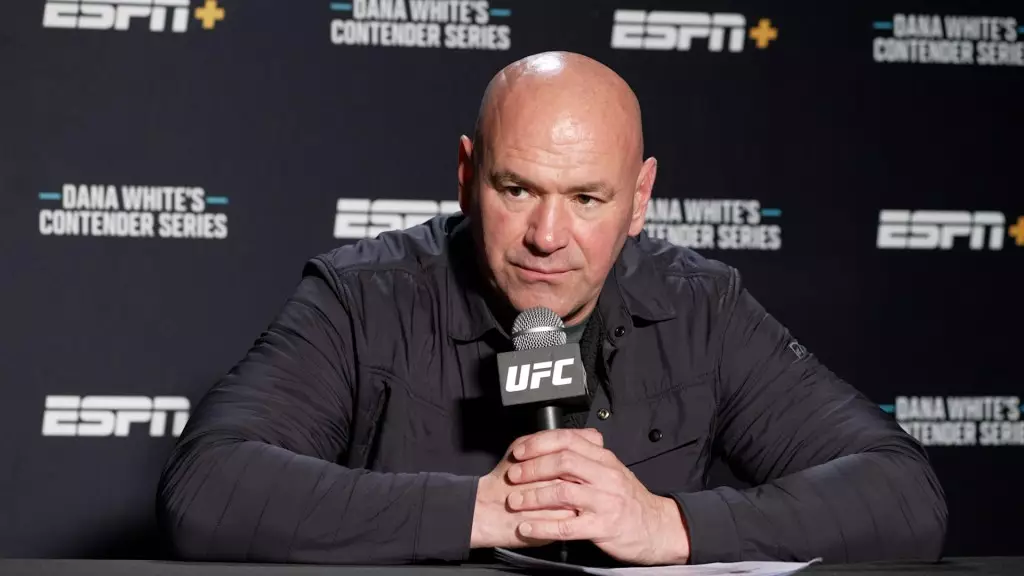The world of combat sports has seen a significant evolution over recent years, with UFC CEO Dana White becoming one of its most recognizable figures. While his promotional efforts have largely focused on mixed martial arts (MMA), whispers of his interest in boxing have persisted. Yet, despite his enthusiasm, significant uncertainty surrounds the actual prospects of his involvement in the sport.
Dana White has often expressed an interest in exploring boxing opportunities, especially during media events and interviews where he drops hints of imminent announcements. Take, for instance, his recent remarks ahead of Fight Pass’s presentation featuring Callum Walsh. White declared that he is committed to the boxing scene: “If you know anything about me, I never say anything that I don’t do – ever.” This bold statement, followed by his admission of exploring the boxing landscape, certainly piques interest. However, it also raises pertinent questions: Is White genuinely poised to venture into boxing, or are these simply empty promises designed to capture attention?
Despite White’s compelling statements and his backing of rising stars like Walsh, there remains a palpable disconnect with the owners of the UFC regarding boxing. Their cautious approach appears to stem from the inherent volatility and fragmentation within the sport. Many stakeholders in boxing seem wary of aligning themselves with a venture that may not yield the anticipated results. Clearly, Dana White’s enthusiasm does not entirely bridge the gap between ambition and execution.
The boxing industry is indeed experiencing a crossroads, characterized by confusion and division. TKO Group Holdings’ president, Mark Shapiro, articulated a general sentiment shared by many insiders, indicating that “boxing at its best is confused and fragmented,” and at its worst, “it’s broken.” Undoubtedly, difficulties in the boxing landscape pose significant challenges for anyone looking to enter it, including White. Given the existing multitude of promoters, title organizations, and broadcasting deals, a new entrant risks becoming obscured within an already crowded market.
Shapiro’s comments highlight that, while there is potential for growth, any strategic move into boxing would need to be organic rather than through traditional acquisitions. This perspective may be useful not only for managing risk but also for understanding the nuances that define boxing as a sport. Given White’s success in promoting MMA, his understanding of operational strategy could indeed enable him to navigate boxing’s complexities.
Intriguingly, both White and Shapiro have suggested that if a boxing venture were to take form, it would most likely involve partnerships rather than outright ownership. Such a strategy would safeguard against the financial risks often associated with launching new sporting endeavors. The consideration of partnership models signifies a shift toward collective growth, ensuring a collaborative approach that can benefit multiple parties within the boxing ecosystem.
The potential to partner with established players—including boxing leagues or even individual promoters—could prove beneficial in overcoming the hurdles that currently constrict the boxing landscape. Strategic partnerships may facilitate shared resources and expertise, paving the way for a sustainable model that can revitalize interest and participation in the sport.
While excitement surrounds the possibility of Dana White’s foray into boxing, the prevailing sentiment from the UFC ownership suggests a measured approach. Although they acknowledge the potential benefits of a boxing vertical, immediate plans to initiate such a venture do not appear to be on the horizon. The evolution of combat sports remains uncertain, and the viability of White’s ambitions in boxing will be determined by both the readiness of the UFC’s leadership and the unique challenges presented by the sport itself.
Ultimately, Dana White’s future in boxing is intertwined with broader industry dynamics and the capacity for collaboration. While his passion for combat sports is indisputable, the rapidly changing landscape of boxing will require not only vision but also flexibility and strategic acumen to transform aspirations into tangible success.

